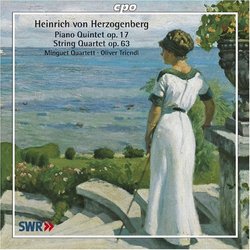| All Artists: Herzogenberg, Minguet Quartett, Triendl Title: Herzogenberg: Piano Quintet Op. 17; String Quartet Op. 63 Members Wishing: 0 Total Copies: 0 Label: Cpo Records Original Release Date: 1/1/2009 Re-Release Date: 7/28/2009 Genre: Classical Styles: Chamber Music, Historical Periods, Classical (c.1770-1830) Number of Discs: 1 SwapaCD Credits: 1 UPC: 761203708222 |
Search - Herzogenberg, Minguet Quartett, Triendl :: Herzogenberg: Piano Quintet Op. 17; String Quartet Op. 63
 | Herzogenberg, Minguet Quartett, Triendl Herzogenberg: Piano Quintet Op. 17; String Quartet Op. 63 Genre: Classical |
Larger Image |
CD Details |
CD ReviewsHerzogenberg Early and Late J Scott Morrison | Middlebury VT, USA | 08/10/2009 (4 out of 5 stars) "Heinrich von Herzogenberg (1843-1900) was from a wealthy and distinguished French family; the name originally was, in French, 'Peccaduc', which his grandfather, when he moved in 1811 to Germany humorously transliterated into 'pic à duc' ('duke's peak') and then translated into German as 'Herzogenberg'. Herzogenberg grew up in the Austrian city of Graz and studied music in Vienna. Initially, like many Germanic composers of that era, he was in thrall to the 'New German' style of Wagner. He even wrote an early opera, 'Columbus', that owes much to Wagner's 'The Flying Dutchman.' In the early 1870s, however, he lost his fascination with things Wagnerian and developed a style that was much more in the Mendelssohn/Schumann/Brahms mold. The first work on this CD, the Piano Quintet Op. 17 in C Major from the mid-1870s is one of the earliest of his Brahmsian pieces. (And of course it owes something to the Schumann Piano Quintet, which had been among the very first piano quintets.) Still there is a Wagnerian drama to Herzogenberg's style in the work, particularly in its first movement. That movement is in a not-quite standard sonata-allegro form, among the first of Herzogenberg's 'classical' movements. The thematic material is not particularly distinguished but the composer does indeed put it through some clever manipulations during its ten-minute length. The second movement is a serene Adagio in song-form. It has a lovely violin/viola canon in its second part. The third movement is a bumptious Scherzo and is followed by an energetic, almost cocky presto Finale, easily the best movement of the work with its memorable tunes and invigorating rhythm.
The String Quartet Op. 63 in F Minor is a much later work, written in 1889 after the composer had relocated to Berlin to become director of the composition department of the Royal Academy of Music. Unusually, it is in three movements. After a slow introduction, the remarkably assured first movement blossoms into a complex yet integrated thirteen-minute sonata allegro with intertwined thematic materials. The lovely Adagio is in two-part quasi-sonata-allegro form without a development section. It is notable for its movement back and forth between A Flat Major and F Minor. The Finale is a spirited vivace in 6/8 variation movement with intimations of a saltarello rhythm. The cpo label has recorded a fair amount of Herzogenberg's chamber music and the pianist in this recording of the Piano Quintet, Oliver Triendl, has appeared on a number of the cpo CDs, e.g. Herzogenberg: Wind Quintet; Wind Trio. He is a fine pianist. The Minguet Quartet had not previously been known by me. I find their playing thoughtful and stylistically apt but there are patches of slightly scrawny sound. The Piano Quintet is a somewhat immature work but has its redeeming features. The Quartet is a fine work with much to recommend it. This is not my favorite Herzogenberg disc, but I'm certainly glad I have it. Scott Morrison " |
